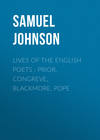Czytaj książkę: «The Works of Samuel Johnson, LL.D. in Nine Volumes, Volume 03», strona 27
No. 180. SATURDAY, DECEMBER 7, 1751
[Greek: Taut eidos sophos isthi, mataen d' Epikouron eason
Poy to kenon zaetein, kai tines ai monades.] AUTOMEDON.
On life, on morals, be thy thoughts employ'd;
Leave to the schools their atoms and their void.
It is somewhere related by Le Clerc, that a wealthy trader of good understanding, having the common ambition to breed his son a scholar, carried him to an university, resolving to use his own judgment in the choice of a tutor. He had been taught, by whatever intelligence, the nearest way to the heart of an academick, and at his arrival entertained all who came about him with such profusion, that the professors were lured by the smell of his table from their books, and flocked round him with all the cringes of awkward complaisance. This eagerness answered the merchant's purpose: he glutted them with delicacies, and softened them with caresses, till he prevailed upon one after another to open his bosom, and make a discovery of his competitions, jealousies, and resentments. Having thus learned each man's character, partly from himself, and partly from his acquaintances, he resolved to find some other education for his son, and went away convinced, that a scholastick life has no other tendency than to vitiate the morals and contract the understanding: nor would he afterwards hear with patience the praises of the ancient authors, being persuaded that scholars of all ages must have been the same, and that Xenophon and Cicero were professors of some former university, and therefore mean and selfish, ignorant and servile, like those whom he had lately visited and forsaken.
Envy, curiosity, and a sense of the imperfection of our present state, incline us to estimate the advantages which are in the possession of others above their real value. Every one must have remarked, what powers and prerogatives the vulgar imagine to be conferred by learning. A man of science is expected to excel the unlettered and unenlightened even on occasions where literature is of no use, and among weak minds, loses part of his reverence, by discovering no superiority in those parts of life, in which all are unavoidably equal; as when a monarch makes a progress to the remoter provinces, the rustics are said sometimes to wonder that they find him of the same size with themselves.
These demands of prejudice and folly can never be satisfied; and therefore many of the imputations which learning suffers from disappointed ignorance, are without reproach. But there are some failures, to which men of study are peculiarly exposed. Every condition has its disadvantages. The circle of knowledge is too wide for the most active and diligent intellect, and while science is pursued, other accomplishments are neglected; as a small garrison must leave one part of an extensive fortress naked, when an alarm calls them to another.
The learned, however, might generally support their dignity with more success, if they suffered not themselves to be misled by the desire of superfluous attainments. Raphael, in return to Adam's inquiries into the courses of the stars, and the revolutions of heaven, counsels him to withdraw his mind from idle speculations, and employ his faculties upon nearer and more interesting objects, the survey of his own life, the subjection of his passions, the knowledge of duties which must daily be performed, and the detection of dangers which must daily be incurred.
This angelick counsel every man of letters should always have before him. He that devotes himself to retired study naturally sinks from omission to forgetfulness of social duties; he must be therefore sometimes awakened and recalled to the general condition of mankind.
I am far from any intention to limit curiosity, or confine the labours of learning to arts of immediate and necessary use. It is only from the various essays of experimental industry, and the vague excursions of minds sent out upon discovery, that any advancement of knowledge can be expected; and, though many must be disappointed in their labours, yet they are not to be charged with having spent their time in vain; their example contributed to inspire emulation, and their miscarriages taught others the way to success.
But the distant hope of being one day useful or eminent, ought not to mislead us too far from that study which is equally requisite to the great and mean, to the celebrated and obscure; the art of moderating the desires, of repressing the appetites, and of conciliating or retaining the favour of mankind.
No man can imagine the course of his own life, or the conduct of the world around him, unworthy his attention; yet, among the sons of learning, many seem to have thought of every thing rather than of themselves, and to have observed every thing but what passes before their eyes: many who toil through the intricacy of complicated systems, are insuperably embarrassed with the least perplexity in common affairs; many who compare the actions, and ascertain the characters of ancient heroes, let their own days glide away without examination, and suffer vicious habits to encroach upon their minds without resistance or detection.
The most frequent reproach of the scholastick race is the want of fortitude, not martial but philosophick. Men bred in shades and silence, taught to immure themselves at sunset, and accustomed to no other weapon than syllogism, may be allowed to feel terrour at personal danger, and to be disconcerted by tumult and alarm. But why should he whose life is spent in contemplation, and whose business is only to discover truth, be unable to rectify the fallacies of imagination, or contend successfully against prejudice and passion? To what end has he read and meditated, if he gives up his understanding to false appearances, and suffers himself to be enslaved by fear of evils to which only folly or vanity can expose him, or elated by advantages to which, as they are equally conferred upon the good and bad, no real dignity is annexed.
Such, however, is the state of the world, that the most obsequious of the slaves of pride, the most rapturous of the gazers upon wealth, the most officious of the whisperers of greatness, are collected from seminaries appropriated to the study of wisdom and of virtue, where it was intended that appetite should learn to be content with little, and that hope should aspire only to honours which no human power can give or take away9.
The student, when he comes forth into the world, instead of congratulating himself upon his exemption from the errours of those whose opinions have been formed by accident or custom, and who live without any certain principles of conduct, is commonly in haste to mingle with the multitude, and shew his sprightliness and ductility by an expeditious compliance with fashions or vices. The first smile of a man, whose fortune gives him power to reward his dependants, commonly enchants him beyond resistance; the glare of equipage, the sweets of luxury, the liberality of general promises, the softness of habitual affability, fill his imagination; and he soon ceases to have any other wish than to be well received, or any measure of right and wrong but the opinion of his patron.
A man flattered and obeyed, learns to exact grosser adulation, and enjoin lower submission. Neither our virtues nor vices are all our own. If there were no cowardice, there would be little insolence; pride cannot rise to any great degree, but by the concurrence of blandishment or the sufferance of tameness. The wretch who would shrink and crouch before one that should dart his eyes upon him with the spirit of natural equality, becomes capricious and tyrannical when he sees himself approached with a downcast look, and hears the soft address of awe and servility. To those who are willing to purchase favour by cringes and compliance, is to be imputed the haughtiness that leaves nothing to be hoped by firmness and integrity.
If, instead of wandering after the meteors of philosophy, which fill the world with splendour for a while, and then sink and are forgotten, the candidates of learning fixed their eyes upon the permanent lustre of moral and religious truth, they would find a more certain direction to happiness. A little plausibility of discourse, and acquaintance with unnecessary speculations, is dearly purchased, when it excludes those instructions which fortify the heart with resolution, and exalt the spirit to independence.
No. 181. TUESDAY, DECEMBER 10, 1751
—Neu fluitem dubue spe pendulus horae. HOR. Lib. i. Ep. xviii. 110.
Nor let me float in fortune's pow'r,
Dependent on the future hour. FRANCIS.
TO THE RAMBLER.
SIR,
As I have passed much of my life in disquiet and suspense, and lost many opportunities of advantage by a passion which I have reason to believe prevalent in different degrees over a great part of mankind, I cannot but think myself well qualified to warn those who are yet uncaptivated, of the danger which they incur by placing themselves within its influence.
I served an apprenticeship to a linen-draper, with uncommon reputation for diligence and fidelity; and at the age of three-and-twenty opened a shop for myself with a large stock, and such credit among all the merchants, who were acquainted with my master, that I could command whatever was imported curious or valuable. For five years I proceeded with success proportionate to close application and untainted integrity; was a daring bidder at every sale; always paid my notes before they were due; and advanced so fast in commercial reputation, that I was proverbially marked out as the model of young traders, and every one expected that a few years would make me an alderman.
In this course of even prosperity, I was one day persuaded to buy a ticket in the lottery. The sum was inconsiderable, part was to be repaid though fortune might fail to favour me, and therefore my established maxims of frugality did not restrain me from so trifling an experiment. The ticket lay almost forgotten till the time at which every man's fate was to be determined; nor did the affair even then seem of any importance, till I discovered by the publick papers that the number next to mine had conferred the great prize.
My heart leaped at the thought of such an approach to sudden riches, which I considered myself, however contrarily to the laws of computation, as having missed by a single chance; and I could not forbear to revolve the consequences which such a bounteous allotment would have produced, if it had happened to me. This dream of felicity, by degrees, took possession of my imagination. The great delight of my solitary hours was to purchase an estate, and form plantations with money which once might have been mine, and I never met my friends but I spoiled all their merriment by perpetual complaints of my ill luck.
At length another lottery was opened, and I had now so heated my imagination with the prospect of a prize, that I should have pressed among the first purchasers, had not my ardour been withheld by deliberation upon the probability of success from one ticket rather than another. I hesitated long between even and odd; considered the square and cubick numbers through the lottery; examined all those to which good luck had been hitherto annexed; and at last fixed upon one, which, by some secret relation to the events of my life, I thought predestined to make me happy. Delay in great affairs is often mischievous; the ticket was sold, and its possessor could not be found.
I returned to my conjectures, and after many arts of prognostication, fixed upon another chance, but with less confidence. Never did captive, heir, or lover, feel so much vexation from the slow pace of time, as I suffered between the purchase of my ticket and the distribution of the prizes. I solaced my uneasiness as well as I could, by frequent contemplation of approaching happiness; when the sun rose I knew it would set, and congratulated myself at night that I was so much nearer to my wishes. At last the day came, my ticket appeared, and rewarded all my care and sagacity with a despicable prize of fifty pounds.
My friends, who honestly rejoiced upon my success, were very coldly received; I hid myself a fortnight in the country, that my chagrin might fume away without observation, and then returning to my shop, began to listen after another lottery.
With the news of a lottery I was soon gratified, and having now found the vanity of conjecture, and inefficacy of computation, I resolved to take the prize by violence, and therefore bought forty tickets, not omitting, however, to divide them between the even and odd numbers, that I might not miss the lucky class. Many conclusions did I form, and many experiments did I try, to determine from which of those tickets I might most reasonably expect riches. At last, being unable to satisfy myself by any modes of reasoning, I wrote the numbers upon dice, and allotted five hours every day to the amusement of throwing them in a garret; and, examining the event by an exact register, found, on the evening before the lottery was drawn, that one of my numbers had been turned up five times more than any of the rest in three hundred and thirty thousand throws.
This experiment was fallacious; the first day presented the hopeful ticket, a detestable blank. The rest came out with different fortune, and in conclusion I lost thirty pounds by this great adventure.
I had now wholly changed the cast of my behaviour and the conduct of my life. The shop was for the most part abandoned to my servants, and if I entered it, my thoughts were so engrossed by my tickets, that I scarcely heard or answered a question, but considered every customer as an intruder upon my meditations, whom I was in haste to despatch. I mistook the price of my goods, committed blunders in my bills, forgot to file my receipts, and neglected to regulate my books. My acquaintances by degrees began to fall away; but I perceived the decline of my business with little emotion, because whatever deficience there might be in my gains, I expected the next lottery to supply.
Miscarriage naturally produces diffidence; I began now to seek assistance against ill luck, by an alliance with those that had been more successful. I inquired diligently at what office any prize had been sold, that I might purchase of a propitious vender; solicited those who had been fortunate in former lotteries, to partake with me in my new tickets; and whenever I met with one that had in any event of his life been eminently prosperous, I invited him to take a larger share. I had, by this rule of conduct, so diffused my interest, that I had a fourth part of fifteen tickets, an eighth of forty, and a sixteenth of ninety.
I waited for the decision of my fate with my former palpitations, and looked upon the business of my trade with the usual neglect. The wheel at last was turned, and its revolutions brought me a long succession of sorrows and disappointments. I indeed often partook of a small prize, and the loss of one day was generally balanced by the gain of the next; but my desires yet remained unsatisfied, and when one of my chances had failed, all my expectation was suspended on those which remained yet undetermined. At last a prize of five thousand pounds was proclaimed; I caught fire at the cry, and inquiring the number, found it to be one of my own tickets, which I had divided among those on whose luck I depended, and of which I had retained only a sixteenth part.
You will easily judge with what detestation of himself, a man thus intent upon gain reflected that he had sold a prize which was once in his possession. It was to no purpose, that I represented to my mind the impossibility of recalling the past, or the folly of condemning an act, which only its event, an event which no human intelligence could foresee, proved to be wrong. The prize which, though put in my hands, had been suffered to slip from me, filled me with anguish, and knowing that complaint would only expose me to ridicule, I gave myself up silently to grief, and lost by degrees my appetite and my rest.
My indisposition soon became visible; I was visited by my friends, and among them by Eumathes, a clergyman, whose piety and learning gave him such an ascendant over me, that I could not refuse to open my heart. There are, said he, few minds sufficiently firm to be trusted in the hands of chance. Whoever finds himself inclined to anticipate futurity, and exalt possibility to certainty, should avoid every kind of casual adventure, since his grief must be always proportionate to his hope. You have long wasted that time, which, by a proper application, would have certainly, though moderately, increased your fortune, in a laborious and anxious pursuit of a species of gain, which no labour or anxiety, no art or expedient, can secure or promote. You are now fretting away your life in repentance of an act, against which repentance can give no caution, but to avoid the occasion of committing it. Rouse from this lazy dream of fortuitous riches, which, if obtained, you could scarcely have enjoyed, because they could confer no consciousness of desert; return to rational and manly industry, and consider the mere gift of luck as below the care of a wise man.
No. 182. SATURDAY, DECEMBER 14, 1751
—Dives qui fieri vult, Et cilo vult fieri.— JUV. Sat. xiv. 176
The lust of wealth can never bear delay.
It has been observed in a late paper, that we are unreasonably desirous to separate the goods of life from those evils which Providence has connected with them, and to catch advantages without paying the price at which they are offered us. Every man wishes to be rich, but very few have the powers necessary to raise a sudden fortune, either by new discoveries, or by superiority of skill, in any necessary employment; and among lower understandings, many want the firmness and industry requisite to regular gain and gradual acquisitions.
From the hope of enjoying affluence by methods more compendious than those of labour, and more generally practicable than those of genius, proceeds the common inclination to experiment and hazard, and that willingness to snatch all opportunities of growing rich by chance, which, when it has once taken possession of the mind, is seldom driven out either by time or argument, but continues to waste life in perpetual delusion, and generally ends in wretchedness and want.
The folly of untimely exultation and visionary prosperity, is by no means peculiar to the purchasers of tickets; there are multitudes whose life is nothing but a continual lottery; who are always within a few months of plenty and happiness, and how often soever they are mocked with blanks, expect a prize from the next adventure.
Among the most resolute and ardent of the votaries of chance, may be numbered the mortals whose hope is to raise themselves by a wealthy match; who lay out all their industry on the assiduities of courtship, and sleep and wake with no other ideas than of treats, compliments, guardians and rivals.
One of the most indefatigable of this class, is my old friend Leviculus, whom I have never known for thirty years without some matrimonial project of advantage. Leviculus was bred under a merchant, and by the graces of his person, the sprightliness of his prattle, and the neatness of his dress, so much enamoured his master's second daughter, a girl of sixteen, that she declared her resolution to have no other husband. Her father, after having chidden her for undutifulness, consented to the match, not much to the satisfaction of Leviculus, who was sufficiently elated with his conquest to think himself entitled to a larger fortune. He was, however, soon rid of his perplexity, for his mistress died before their marriage.
He was now so well satisfied with his own accomplishments, that he determined to commence fortune-hunter; and when his apprenticeship expired, instead of beginning, as was expected, to walk the Exchange with a face of importance, or associating himself with those who were most eminent for their knowledge of the stocks, he at once threw off the solemnity of the counting-house, equipped himself with a modish wig, listened to wits in coffee-houses, passed his evenings behind the scenes in the theatres, learned the names of beauties of quality, hummed the last stanzas of fashionable songs, talked with familiarity of high play, boasted of his achievements upon drawers and coachmen, was often brought to his lodgings at midnight in a chair, told with negligence and jocularity of bilking a tailor, and now and then let fly a shrewd jest at a sober citizen.
Thus furnished with irresistible artillery, he turned his batteries upon the female world, and, in the first warmth of self-approbation, proposed no less than the possession of riches and beauty united. He therefore paid his civilities to Flavilla, the only daughter of a wealthy shop-keeper, who not being accustomed to amorous blandishments, or respectful addresses, was delighted with the novelty of love, and easily suffered him to conduct her to the play, and to meet her where she visited. Leviculus did not doubt but her father, however offended by a clandestine marriage, would soon be reconciled by the tears of his daughter, and the merit of his son-in-law, and was in haste to conclude the affair. But the lady liked better to be courted than married, and kept him three years in uncertainty and attendance. At last she fell in love with a young ensign at a ball, and having danced with him all night, married him in the morning.
Leviculus, to avoid the ridicule of his companions, took a journey to a small estate in the country, where, after his usual inquiries concerning the nymphs in the neighbourhood, he found it proper to fall in love with Altilia, a maiden lady, twenty years older than himself, for whose favour fifteen nephews and nieces were in perpetual contention. They hovered round her with such jealous officiousness, as scarcely left a moment vacant for a lover. Leviculus, nevertheless, discovered his passion in a letter, and Altilia could not withstand the pleasure of hearing vows and sighs, and flatteries and protestations. She admitted his visits, enjoyed for five years the happiness of keeping all her expectants in perpetual alarms, and amused herself with the various stratagems which were practised to disengage her affections. Sometimes she was advised with great earnestness to travel for her health, and sometimes entreated to keep her brother's house. Many stories were spread to the disadvantage of Leviculus, by which she commonly seemed affected for a time, but took care soon afterwards to express her conviction of their falsehood. But being at last satiated with this ludicrous tyranny, she told her lover, when he pressed for the reward of his services, that she was very sensible of his merit, but was resolved not to impoverish an ancient family.
He then returned to the town, and soon after his arrival, became acquainted with Latronia, a lady distinguished by the elegance of her equipage, and the regularity of her conduct. Her wealth was evident in her magnificence, and her prudence in her economy, and therefore Leviculus, who had scarcely confidence to solicit her favour, readily acquitted fortune of her former debts, when he found himself distinguished by her with such marks of preference as a woman of modesty is allowed to give. He now grew bolder, and ventured to breathe out his impatience before her. She heard him without resentment, in time permitted him to hope for happiness, and at last fixed the nuptial day, without any distrustful reserve of pin-money, or sordid stipulations for jointure, and settlements.
Leviculus was triumphing on the eve of marriage, when he heard on the stairs the voice of Latronia's maid, whom frequent bribes had secured in his service. She soon burst into his room, and told him that she could not suffer him to be longer deceived; that her mistress was now spending the last payment of her fortune, and was only supported in her expense by the credit of his estate. Leviculus shuddered to see himself so near a precipice, and found that he was indebted for his escape to the resentment of the maid, who having assisted Latronia to gain the conquest, quarrelled with her at last about the plunder.
Leviculus was now hopeless and disconsolate, till one Sunday he saw a lady in the Mall, whom her dress declared a widow, and whom, by the jolting prance of her gait, and the broad resplendence of her countenance, he guessed to have lately buried some prosperous citizen. He followed her home, and found her to be no less than the relict of Prune the grocer, who, having no children, had bequeathed to her all his debts and dues, and his estates real and personal. No formality was necessary in addressing madam Prune, and therefore Leviculus went next morning without an introductor. His declaration was received with a loud laugh; she then collected her countenance, wondered at his impudence, asked if he knew to whom he was talking, then shewed him the door, and again laughed to find him confused. Leviculus discovered that this coarseness was nothing more than the coquetry of Cornhill, and next day returned to the attack. He soon grew familiar to her dialect, and in a few weeks heard, without any emotion, hints of gay clothes with empty pockets; concurred in many sage remarks on the regard due to people of property; and agreed with her in detestation of the ladies at the other end of the town, who pinched their bellies to buy fine laces, and then pretended to laugh at the city.
He sometimes presumed to mention marriage; but was always answered with a slap, a hoot, and a flounce. At last he began to press her closer, and thought himself more favourably received; but going one morning, with a resolution to trifle no longer, he found her gone to church with a young journeyman from the neighbouring shop, of whom she had become enamoured at her window.
In these, and a thousand intermediate adventures, has Leviculus spent his time, till he is now grown grey with age, fatigue, and disappointment. He begins at last to find that success is not to be expected, and being unfit for any employment that might improve his fortune, and unfurnished with any arts that might amuse his leisure, is condemned to wear out a tasteless life in narratives which few will hear, and complaints which none will pity.



















